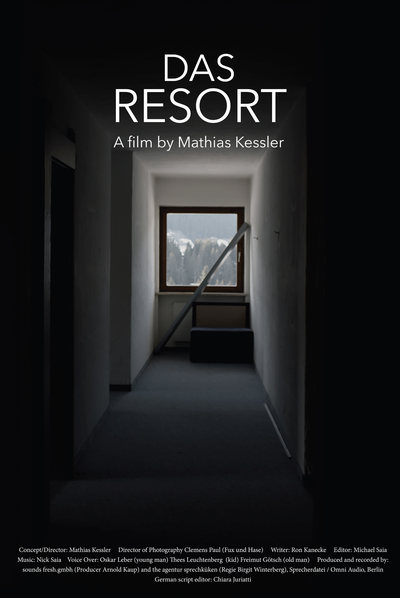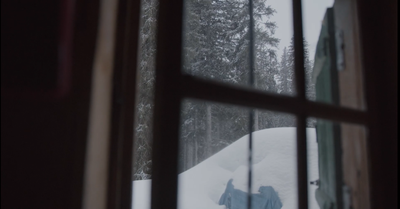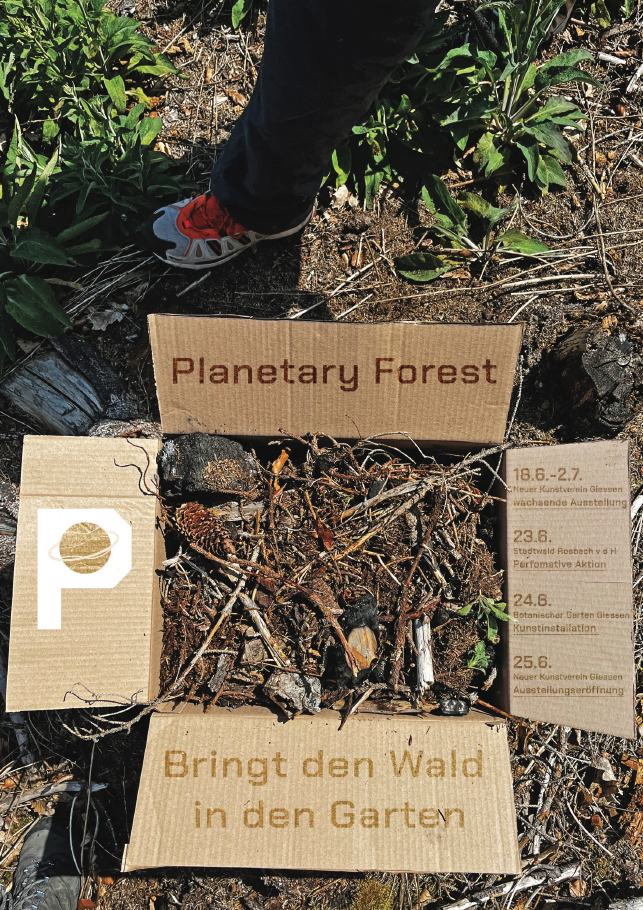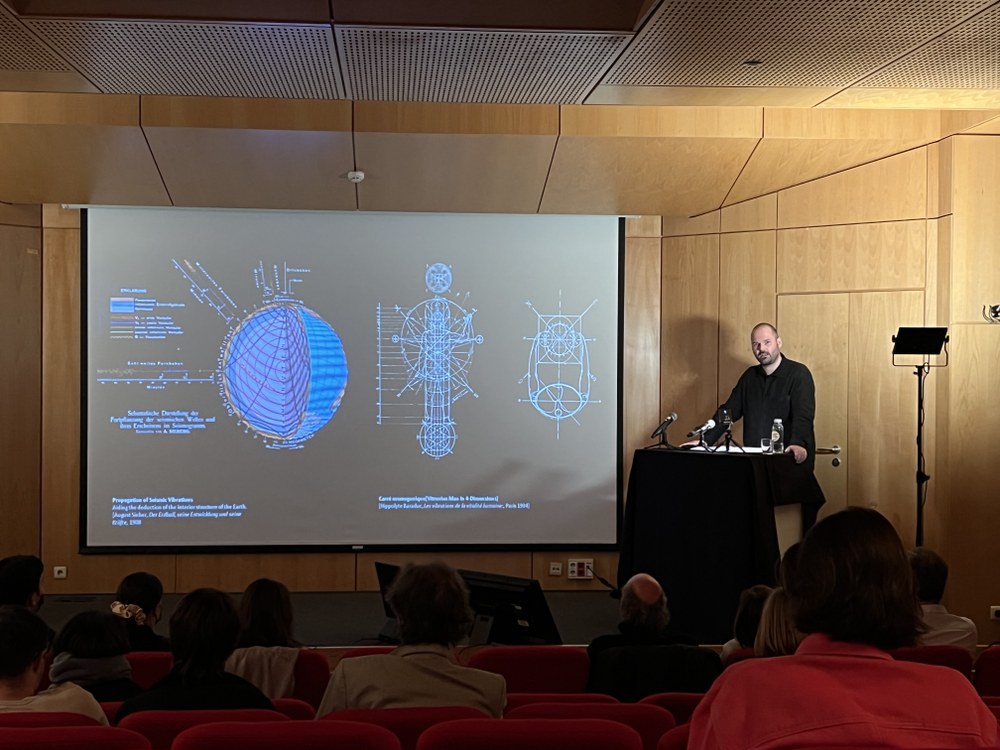Art Projects
Das Resort (2022). A Film by Mathias Kessler

The short film "Das Resort", directed by our Fellow Mathias Kessler was made under the impressions of the first Covid-19 lockdown. Adapted from a script by screenwriter Ron Kanecke and translated into German by Chiara Juriatti, the film tells of the nameless narrator's search for his father in a world where humans have been silenced by a virus. Against the backdrop of an unspecified mountain village, a narrative unfolds away from linear time, along memories of childhood, the father, and the world before and after catastrophe. Sweeping and striking landscape shots of lonely mountain huts, snow-covered ski slopes, and abandoned mountain villages reveal a ghostly, dystopian emptiness that emphasizes the absence of man. Kessler's award-winning film invites reflections on man's inescapable impact on nature and the state of a society in which technical progress becomes an end in itself. His theses are forceful: the idea of a return to a pristine nature through human withdrawal is naïve. Human activity has already left its traces in such an all-encompassing way that even the most abandoned places are marked by them. Finally, our social development towards more and more technological progress blocks the view of what would actually be necessary for human and non-human well-being. A trailer for the film is shown here.
"Das Resort" has been nominated for and won awards many times since its release. For example, the film was selected for the Seattle Film Festival (Sept. 30, 2022), The IndieFEST Film Awards (Nov. 01, 2022) and for the Amsterdam Lift-Off Film Festival (Oct. 01, 2023). Semi-finalist at the Berlin Shorts Awards (Oct. 21, 2022) and finalist for NewFilmmakers NY (Jan. 04, 2023), the film won awards at the Phoenix Shorts (Oct. 28, 2022) and the Independent Shorts Awards, LA (Nov. 12, 2022).
We are happy to report that one of the first screenings of this impressive film could take place at the Planetary Hub! The film will also be shown at other screenings such as on Dec. 10 from 8:00 p.m. as part of a Finissage by Twenty Magazine with films by Rosa Aiello, Rachel Ashton and Mathias Kessler at Cittipunkt Berlin.
More information about "Das Resort" and further works by Mathias Kessler can be found here.
 |
 |
Planetary Forest: Bring the forest into the garden
|
The participatory artwork Planetary Forest: Bring the Forest into the Garden refers to the scientific and cultural-technical construction of worlds. Placed on a free-standing green area next to the newly built greenhouses of the Botanical Garden Giessen, the regional forest soil is relocated and recreated as a living sculpture. The planetary material comes from an ecological disturbance area in the city forest of Rosbach vor der Höhe, Hesse, which was severely affected by forest dieback. The supposedly natural forest is carried into the man made world of the botanical garden. There, it serves as an ethical, aesthetic, ecological, and political disruption that sensitizes visitors to the forest dieback topic and the artificiality of nature. Like a crack in the perfectly constructed reality, a discourse opens up here about the problems caused by climate change and human impact in local forests and in the planetary context. |

|
We cordially invite you all to visit the living work of art and send dated photos to panel@planet.uni-giessen.de. Experience the Rosbacher City Forest in the Botanical Garden Giessen!
A project by Dr. Claudia Hartl, Mathias Kessler, and Clemens Finkelstein; Fellows at the Panel on Planetary Thinking of the Justus-Liebig-University Giessen
With the kind support of the Botanical Garden Giessen, Neuer Kunstverein Giessen e.V., and the city Rosbach vor der Höhe
For two weeks, the Neuer Kunstverein Gießen e.V. also hosted an accompanying exhibition at its premises, which documented the work of the three Fellows at the Panel on Planetary Thinking. On display were, among others, Line Drawings and "The Arctic Ocean - Failed Hope" by Mathias Kessler, Vibrascapes by Clemens Finkelstein and Dendro Art by Claudia Hartl.
May 2022 - Contributions by Clemens Finkelstein to SICK ARCHITECTURE
|
“Concerns of human and planetary health have always been closely entangled, growing increasingly closer at a moment when public discussions shift focus to lament the Earth’s transformation from a biosphere (a sphere of life) to a thanatosphere (a sphere of death). Yet, instead of evolving towards equilibrium—as entangled objects do according to current physical theories of thermodynamics and quantum mechanics—their relationship has unraveled into sustained disequilibrium. Planetary infirmity is materialized through significant climatic shifts, excessive anthropogenic vibrations, the resultant corruption of its biospheric system, as well as the redistribution of its mass and axis through glacial melting.”
Planetary Scholar and current Fellow of the Planetary Scholars and Artists in Residence Program Clemens Finkelstein recently contributed the essay “Planetary Disequilibrium”, the inter-active exhibit “sick world building syndrome”, and the eponymous lecture to SICK ARCHITECTURE, a collaboration between Beatriz Colomina, e-flux Architecture, CIVA Brussels, and Princeton University. The exhibition at CIVA Brussels was open from May 6 to August 28, 2022. |

|
